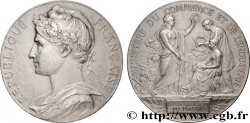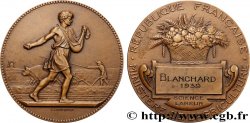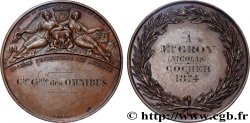Not available.
Item sold on our e-shop (2023)
Price : 220.00 €
Item sold on our e-shop (2023)
Price : 220.00 €
Type : Médaille parlementaire, VIIe législature, Frédéric Garnier
Date: 1898
Mint name / Town : 17 - Charente-Maritime
Metal : silver
Diameter : 50 mm
Orientation dies : 12 h.
Engraver BOURGEOIS Léon Max (1839-1901)
Weight : 67,16 g.
Edge : lisse + corne d’abondance ARGENT
Puncheon : corne d’abondance ARGENT
Rarity : R3
Coments on the condition:
Exemplaire astiqué. Coups sur la tranche à 3 et 9 heures au revers. Frottements dans les champs et fines rayures au revers
Obverse
Obverse legend : REPUBLIQUE - FRANÇAISE.
Obverse description : Buste cuirassé et drapé de la République à droite, portant une couronne de laurier sur un bonnet de la liberté ; en bas à droite MAX BOURGEOIS.
Reverse
Reverse legend : CHAMBRE DES DEPUTES / .1898. // SUFFRAGE UNIVERSEL // GARNIER / CHARENTE-INFERIEURE.
Reverse description : Urne électorale timbré de l’inscription SUFFRAGE UNIVERSEL, reposant sur un drapeau de la République française et entouré de deux branches de chêne ; Cartouche timbré du nom et du département du récipiendaire ; signé : MB.
Commentary
Médaille attribuée en 1898 à Frédéric Garnier, député de la Charente-Inférieure à l’occasion de la VIIe législature. Il naquit le 24 février 1836 à Rochefort (Charente-Maritime) et décéda le 6 août 1905 à Contrexéville (Vosges). En 1864 il est conseiller général du canton de Royan, puis conseiller municipal de Vaux-sur-Mer de 1865 à 1870, puis maire de Royal en 1870, mandat qu’il conversera pendant 25 ans, jusqu’à son décès. Il fut député de la Charente-Maritime de 1889 à 1903 et était inscrit au groupe de l’Union progressiste. Il fut sénateur de la Charente-Maritime de 1903 à 1905.
Medal awarded in 1898 to Frédéric Garnier, deputy of Charente-Inférieure during the 7th legislature. He was born on February 24, 1836 in Rochefort (Charente-Maritime) and died on August 6, 1905 in Contrexéville (Vosges). In 1864 he was a general councilor for the canton of Royan, then municipal councilor of Vaux-sur-Mer from 1865 to 1870, then mayor of Royal in 1870, a mandate he held for 25 years, until his death. He was a deputy of Charente-Maritime from 1889 to 1903 and was registered with the Progressive Union group. He was a senator for Charente-Maritime from 1903 to 1905
Medal awarded in 1898 to Frédéric Garnier, deputy of Charente-Inférieure during the 7th legislature. He was born on February 24, 1836 in Rochefort (Charente-Maritime) and died on August 6, 1905 in Contrexéville (Vosges). In 1864 he was a general councilor for the canton of Royan, then municipal councilor of Vaux-sur-Mer from 1865 to 1870, then mayor of Royal in 1870, a mandate he held for 25 years, until his death. He was a deputy of Charente-Maritime from 1889 to 1903 and was registered with the Progressive Union group. He was a senator for Charente-Maritime from 1903 to 1905








 Report a mistake
Report a mistake Print the page
Print the page Share my selection
Share my selection Ask a question
Ask a question Consign / sell
Consign / sell
 Full data
Full data















